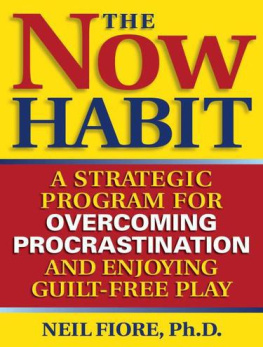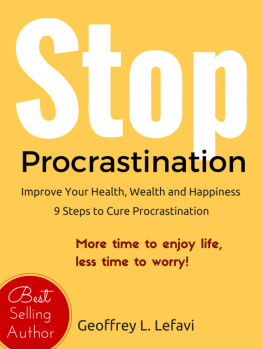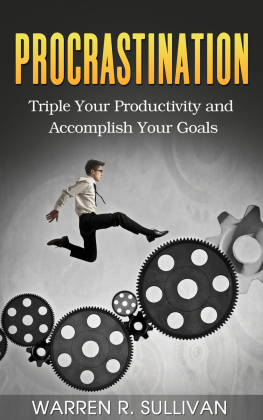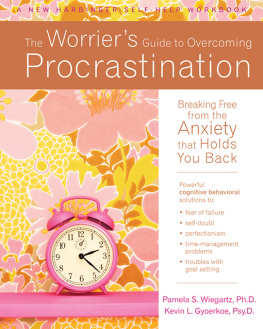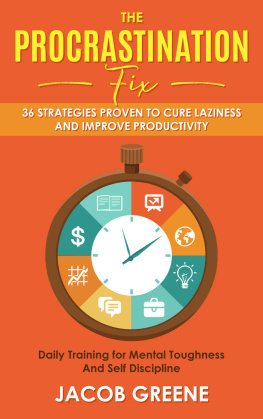ACKNOWLEDGMENTS
This book came out of my own struggles with procrastination, motivation, and creativity, but in large part it is based on the experiences of thousands of coaching and therapy clients and seminar participants who have shared their difficulties and their triumphs with me. I wish to acknowledge the contribution of these courageous individuals who repeatedly faced their fears and found within themselves the strength to try again. Their stories are told with the names, jobs, and situations changed to protect their privacy.
I also wish to acknowledge the constant support and love of my family and friends, who offered me so many guilt-free meals and opportunities for guilt-free play. The staff at the University of California Berkeleys Counseling Center deserves special mention for its support over many years. I want to thank Jeremy P. Tarcher, who believed in the early, rough draft of the manuscript and had the vision to see this book. I will continue to be grateful for the advice and help of my agents. I am very grateful to friends who read rough drafts and offered constructive criticism, but I especially appreciate the assistance of Jayne Walker and Harriet Whitman Lee. And I wish to acknowledge the editing skill and wise counsel of Hank Stine and the inspiration of Janice Gallagher, both of whom contributed greatly to the organization of this book.
ABOUT THE AUTHOR
Neil A. Fiore, Ph.D., is a management consultant and licensed psychologist in private practice in Berkeley, California. He has served as a psychologist at the University of California and as a consultant to industry and health and educational institutions. He has been published in The New England Journal of Medicine, Science Digest, and Boardroom Reports, and has appeared on numerous radio and television programs across the country. Dr. Fiore is widely acknowledged as an expert in the areas of health psychology, optimal performance, stress management, and hypnosis.
BIBLIOGRAPHY
Adyashanti. Emptiness Dancing. Louisville, CO: Sounds True, 2006.
Allport, Gordon. Becoming: Basic Considerations for a Psychology of Personality. New Haven: Yale University Press, 1955.
Bandura, Albert. Self-Efficacy: The Exercise of Control. New York: W. H. Freeman, 1997.
. The Self System in Reciprocal Determinism. American Psychologist, 1978, 33, 344- 358.
Baum, K., and R. Trubo. The Mental Edge: Maximize Your Sports Potential with the Mind/Body Conntection. New York: Perigee, 1999.
Beery, Rich G. Fear of Failure in the Student Experience. Personnel and Guidance Journal, 1975, 54, 190-203.
Bliss, Edwin C. Getting Things Done: The ABCs of Time Management. New York: Bantam, 1978.
Bolen, Jean Shinoda. The Tao of Psychology: Synchronicity and the Self. New York: Harper & Row, 1979.
Borod, J. C. (ed.). The Neuropsychology of Emotion. New York: Oxford University Press, 2000.
Bowlby, John. Separation: Anxiety and Anger. New York: Basic Books, 1973.
Bradbury, Ray. Zen in the Art of Writing: Essays on Creativitiy. Santa Barbara: Capra Press, 1990.
Budd, Matthew. You Are What You Say: A Harvard Doctors Six-Step Proven Program for Transforming Stress Through the Power of Language. New York: Crown, 2000.
Burka, Jane, and Lenora Yuen. Procrastination: Why You Do It, What to Do About It. Menlo Park, CA: Addison Wesley, 1984.
Burns, D. Feeling Good: The New Mood Therapy. New York: Avon, 1999.
Cousins, Norman. Anatomy of an Illness as Perceived by the Patient. New York: Bantam, 1981.
. The Healing Heart. New York: W. W. Norton, 1983.
Davis, Martha, Mathew McKay, and Elizabeth Eschelman. The Relaxation & Stress Reduction Handbook. Richmond, CA: New Harbinger, 1980.
Ellis, A., and W. J. Knaus. Overcoming Procrastination. New York: Signet, 1977.
Erickson, M. H. An Hypnotic Technique for Resistant Patients: The Patient, the Techniques, and Its Rationale and Field Experiments. American Journal of Clinical Hypnosis, 1964, 1, 8-32.
Fadiman, J. Unlimit Your Life: Setting & Getting Goals. Berkeley, CA: Celestial Arts, 1990.
Fiore, Neil A. The Road Back to Health: Coping with the Emotional Side of Cancer. Berkeley, CA: Celelestial Arts, 1991.1.
, and Susan C. Pescar. Conquering Test Anxiety. New York: Warner Books, 1987.
Fox, Matthew. Original Blessing. Santa Fe, NM: Bear, 1983.
Frederick, C., and S. McNeal. Inner Strength: Contemporary Psychotherapy and Hypnosis for Ego Strengthening. Mahwah, NJ: Lawrence Erlebaum, 1999.
Fromm, Eric. Man for Himself. New York: Holt, Rinehart, & Winston, 1947.
Garfield, Charles A., with Hal Zina Bennett. Peak Performance: Mental Training Techniques of the Worlds Greatest Athletes. Los Angeles: Jeremy P. Tarcher, Inc., 1984.
Girdano, Daniel A., and George S. Everly. Controlling Stress and Tension. Englewood Cliffs, NJ: Prentice Hall, 1986.
Goldberg, E. The Executive Brain: Frontal Lobes and the Civilized Mind. Oxford: Oxford University Press, 2001.
Goldberg, Natalie. Writing Down the Bones: Freeing the Writer Within. Boston: Shambhala, 1998.
Goleman, Daniel. Emotional Intelligence: Why It Can Matter More Than IQ. New York: Bantam, 1997.
. Concentration Is Likened to Euphoric States of Mind. The New York Times, March 4, 1986, pp. 21-22.
Griffin, Susan. Pornography and Silence: Cultures Revenge Against Nature. New York: Harper & Row, 1981.
Jacobs, T. O. Leadership and Exchange in Formal Organizations. Alexandria, VA: Human Resources Research Organization, 1971.
James, William. The Energies of Men. Memories and Studies, edited by H. James Jr. New York: Longmans, Green & Company, 1911.
Jampolsky, Gerald. Love Is Letting Go of Fear. Millbrae, CA: Celestial Arts, 1979.
Jaynes, Julian. The Origin of Consciousness in the Breakdown of the Bicameral Mind. Boston: Houghton Mifflin, 1976.
Kanfer, Frederick H., and Jeanne S. Phillips. Learning Foundations of Behavior Therapy. New York: John Wiley & Sons, 1970.
Keillor, Garrison. Lake Wobegon Days. New York: Penguin, 1985.
Knaus, W. J. Do It Now: How to Stop Procrastinating. Englewood Cliffs, NJ: Prentice Hall, 1979.
Kobasa, Suzanne C. The Hardy Personality: Toward a Social Psychology of Stress and Health. Social Psychology of Health and Illness, edited by Glenn S. Sanders and Jerry Suls. Hills-dale, NJ: Lawrence Erlbaum, 1982, pp. 3-32.
. Stressful Life Events, Personality and Health: An Inquiry into Hardiness. Journal of Personality and Social Psychology, 1979, 37, 1-11.
, and Mark C. Puccetti. Personality and Social Resources in Stress Resistance. Journal of Personality and Social Psychology, 1983, 45 (4), 839-850.
Lakein, Alan. How to Get Control of Your Time and Your Life. New York: Signet, 1973.
Linville, Patricia W. Self-Complexity as a Cognitive Buffer Against Stress-Related Illness and Depression. Journal of Personality and Social Psychology, 1987, 52 (4), 663-676.
Lippke, S., J. P. Ziegelmann, and R. Schwarzer. Stage-Specific Adoption and Maintenance of Physical Activity: Testing a Three-Stage Model. Psychology of Sport & Exercise, 2005, 6, 585-603.
Loehr, James E., and T. Schwartz. The Power of Full Engagement: Managing Energy, Not Time, Is the Key to High Performance and Personal Renewal

